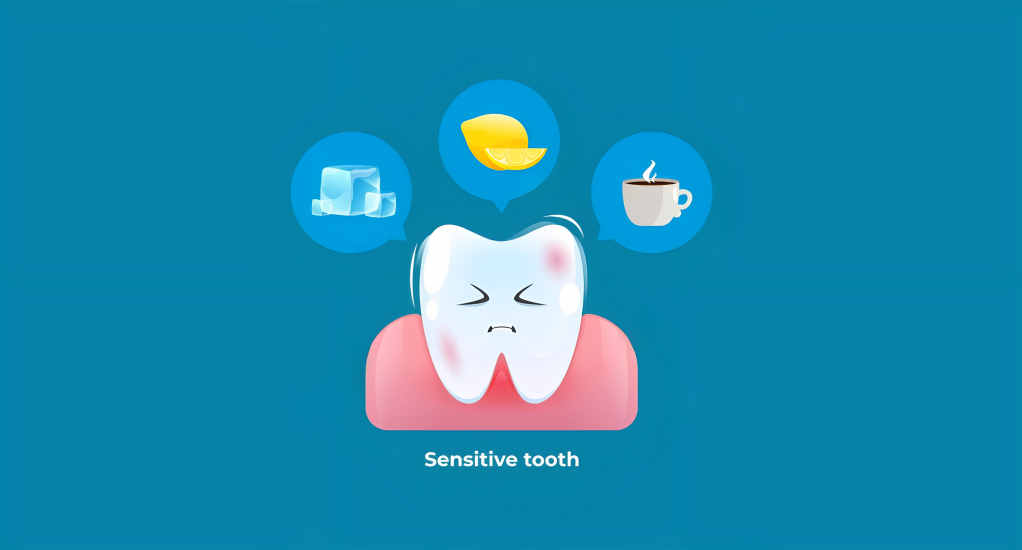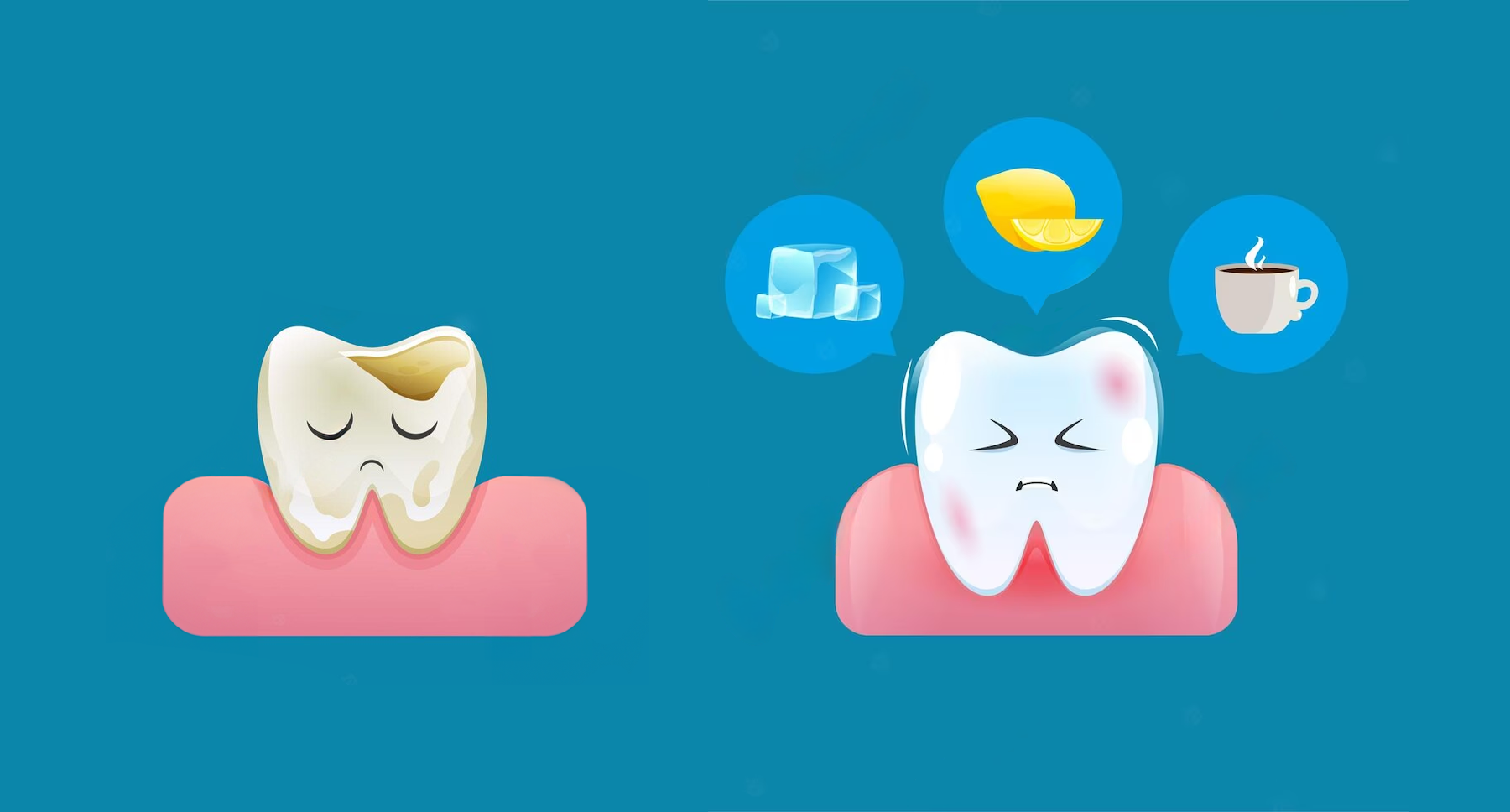Are you enjoying your morning coffee to experience a sudden discomfort in your teeth? If so, you may be dealing with tooth sensitivity. This comprehensive guide, presented by the experts at Trust Dental Care, delves into the world of tooth sensitivity, exploring its causes, symptoms, and effective solutions. Whether about sudden tooth sensitivity or seeking relief during pregnancy, we’ve got you covered. Don’t delay addressing tooth sensitivity—let’s explore why and how you can manage it.
Unraveling the Mystery: What Causes Tooth Sensitivity?
Tooth sensitivity can stem from various factors, including worn enamel, exposed tooth roots, dental issues like cavities or cracked teeth, and gum disease. But there’s more to it than that. Tooth sensitivity can also arise due to certain scenarios and circumstances. For instance, some individuals might experience tooth sensitivity months after dental filling. This discomfort can persist as the tooth adjusts to the new filling material.
Additionally, pregnant individuals may notice heightened tooth sensitivity due to hormonal fluctuations during pregnancy. It’s crucial to understand that while these factors contribute to sensitivity, they are not causes in and of themselves. They exacerbate an underlying vulnerability in your teeth, making them react more strongly to triggers like hot, cold, or sweet stimuli.

Navigating Specific Scenarios: Pregnancy, Dental Procedures, and More
Tooth Sensitivity During Pregnancy
Pregnancy is a time of change, and it’s not uncommon for hormonal fluctuations to lead to increased tooth sensitivity. The changes in hormone levels can impact the blood flow to your gums, making them more sensitive. This sensitivity might be more pronounced in response to certain triggers, such as temperature changes or acidic foods. If you’re experiencing this, professional guidance and good oral hygiene can help manage the discomfort. Ensuring you’re using toothpaste designed for sensitive teeth can be particularly beneficial during this period.

Tooth Sensitivity Months After Filling
A common concern is tooth sensitivity that arises months after getting a dental filling. This phenomenon can be perplexing, especially if you associate the filling with relief from dental issues. The discomfort you’re feeling might be due to several factors. It’s possible that the filling hasn’t fully settled into place, leading to minor adjustments in your bite. Additionally, the dental pulp might be responding to the changes brought about by the filling. This sensation is usually transient and tends to improve as your tooth adapts. However, consulting your dentist is advisable if the sensitivity persists or worsens.
Finding Relief: Strategies to Manage Tooth Sensitivity
Tooth Sensitivity Relief
If tooth sensitivity is bothering you, relief is possible. Consider using toothpaste formulated for sensitive teeth, which can gradually reduce discomfort by blocking triggers that cause pain. These toothpaste often contain compounds like potassium nitrate or strontium chloride, which help desensitize the nerves in your teeth. The application of fluoride can also aid in reducing sensitivity by strengthening the enamel. Fluoride treatments can be administered by your dentist or prescribed for at-home use with specialized trays. For more severe cases of sensitivity, dentists can employ dental bonding or sealants to shield exposed root surfaces, offering significant relief. These solutions, combined with gentle brushing techniques and maintaining a good oral hygiene routine, can make a notable difference in managing tooth sensitivity.
Addressing Your Concerns: Tooth Sensitivity and Oral Health
Why Is My Tooth Sensitive All of a Sudden?
Sudden tooth sensitivity can catch you off guard. It might be due to recent dental procedures, enamel erosion from acidic foods, or even nighttime teeth grinding. Consulting a dentist can help identify the cause and provide solutions. For instance, if you’ve recently undergone dental work, such as a filling or crown placement, the tooth might be temporarily sensitive due to the procedure’s impact on the tooth’s nerve. Alternatively, consuming acidic foods and beverages or using abrasive toothpaste can contribute to enamel erosion, which exposes the dentin and leads to sensitivity.
Can Tooth Sensitivity Go Away?
The good news is that, in some cases, tooth sensitivity can improve or disappear. You might find relief from the discomfort with improved oral hygiene practices and the right treatments. However, it’s essential to remember that the outcome varies depending on the underlying cause of the sensitivity. For instance, if your sensitivity is due to gum recession, the exposure of the tooth’s root might make the discomfort more persistent. Consulting a dentist is crucial to determine the best approach for managing your specific situation.
Should I Worry About Sensitive Teeth?
Occasional tooth sensitivity can be normal, but persistent discomfort warrants attention. It’s a good idea to consult a dentist to rule out underlying issues and receive proper guidance. If left untreated, Ignoring persistent sensitivity could lead to more severe dental problems. Your dentist can thoroughly examine the root cause of your sensitivity and recommend suitable treatments.
What Is the Difference Between a Toothache and Tooth Sensitivity?
A toothache usually involves continuous or throbbing pain, while tooth sensitivity manifests as brief, sharp discomfort triggered by specific stimuli. Toothaches often indicate an underlying issue, such as a cavity or infection, whereas sensitivity is often a response to external triggers, such as hot or cold temperatures.

Embrace a Future Free from Sensitivity
Tooth sensitivity doesn’t have to disrupt your daily life. The experts at Trust Dental Care are here to guide you through understanding, managing, and overcoming tooth sensitivity. Whether you’re seeking relief during pregnancy, wondering about sudden sensitivity, or aiming to adopt strategies for managing it, their experienced team can provide valuable insights and solutions. Don’t let sensitivity hinder your smile’s brilliance. You can enjoy a pain-free future with the right care and professional guidance.
For more information on dental tourism and maintaining oral health, visit us here. Taking proactive steps toward addressing tooth sensitivity today can lead to a more comfortable and confident smile tomorrow. Remember, a healthy smile is a happy smile!




Leave a Reply